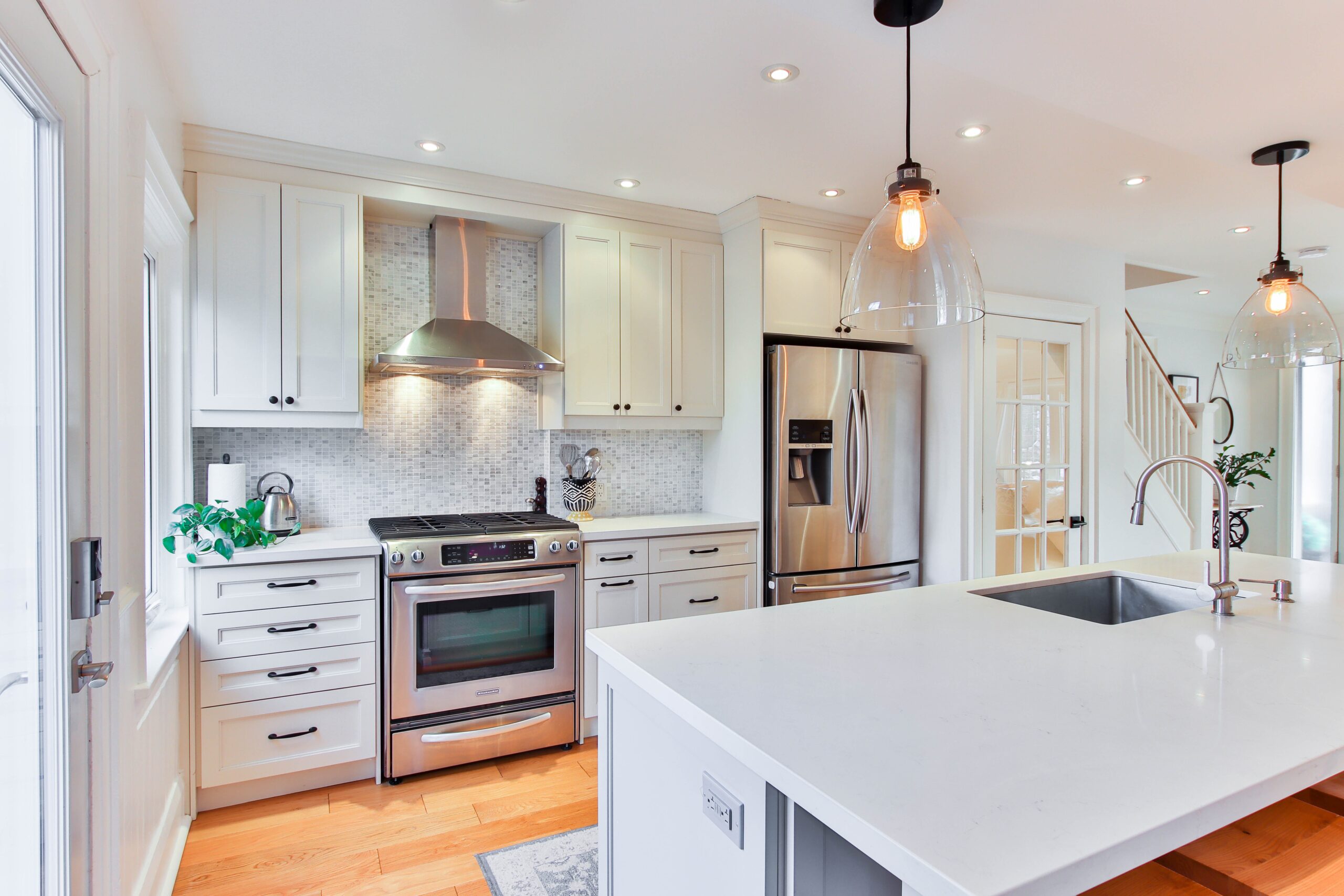Caesarstone vs Corian: Which Countertop Material is Right for Your Project?


Andrea Erickson
Andrea Erickson, an esteemed BPA Advisor specializing in Interior Design & Staging, takes delight in sharing her extensive knowledge and expertise in renovation and interior design. With a focus on interior design and staging, Andrea contributes valuable insights that shape discussions on innovative construction practices and materials, particularly in the realm of creating aesthetically pleasing and functional interiors.
One of the beauties of selecting countertops is the fact that you’re going to have a plethora of options. This can include colors, textures, patterns, and materials, but it can go far beyond that too. One of the two more popular options would be Corian vs. Caesarstone quartz. These two major brands are considered premium and can instantly elevate a kitchen or bathroom countertop to make it feel more luxurious.
While there are some similarities to these two brands, such as their aesthetics and design elements, they’re pretty contrasting regarding their materials and quality. If you need help choosing between the two, you’re in luck! So, here are some of the significant differences when it comes to Caesarstone vs. Corian!
Corian vs. Caesarstone: What Are They?
It can be agreed that both are brands for countertop surfaces for bathrooms and kitchens, but what exactly are they?
Corian
Corian is a brand name, but this is also a reference to solid surfaces that contain natural minerals and polymers. Unlike premium countertops such as quartz or natural stone, the price is much lower, thanks to its materials. It’s the low cost that makes this preferred by a lot of homeowners. Some of the competing brands for Corian can include Fenix, Swanstone, and Samsung Staron.
Caesarstone
A beloved premium brand, this utilizes quarts for its countertops, which has made its brand name synonymous with quartz countertops all around. This combines natural minerals, man-made minerals, and resins. Some of the competing brands will include Cambria and Silestone.
Corian vs. Caesarstone: The Main Differences

Just as there are some major differences between Corian vs. Silestone, the same can be said against Caesarstone. One of the few comparisons that can be made between Caesarstone and Corian would be that they’re both manufacturers that create homogenous countertop materials that emulate natural stone. Both of these brands offer products that can mimic natural stone for surfaces. Beyond that, they’re not even in the same category of materials either.
Corian falls into solid surface materials, while Caesarstone is in the engineered stone category, such as quartz. What does solid surface mean? This means that the product has a high amount of resins in its content. On the other hand, engineered stone, such as quartz, is a product that contains less resin (about five times less) which does make it a more stone-like material. Other than that difference, there are some other differences between the two.
The Cost
Corian is a much cheaper material, so many homeowners will opt for this over quartz. Caesarstone quartz costs more per square foot than Corian does. This is mostly due to quartz being easier to maintain and more durable material however, if you want something for decades to come, then Caesarstone could be the optimal option.
Resale Value
The average consumer doesn’t consider Corian a premium countertop brand or material. It is, however, a nice alternative to laminate. In general, don’t expect the resale value for Corian to be high. Caesarstone, on the other hand, has a different story. Quartz is considered to be more desirable than natural stone. Therefore, you can count on the higher resale value for Caesarstone quartz.
Composition
A significant concern that many homeowners have when selecting the material for their countertops is the appearance and feel of it. No one wants a countertop that looks and feels like plastic, instantly giving it a cheap appearance. Caesarstone gives a natural stone-like appearance and feel. This is one of the biggest advantages that Caesarstone has. On the other hand, Corian has a less authentic appearance due to the polymers. If appearance matters a lot to you, then Caesarstone will be the best option out of the two.
Stain Resistance
Don’t count on any countertop material is completely stain resistant. However, the good news is that when it comes to Caesarstone vs Corian, they’re both quite good at resisting most stains. Corian and Caesarstone can both resist stains from CLASS 1 reagents, so this can include products such as coffee, tomato sauce, blood, and olive oil. Another similarity is that CLASS II reagents such as acids and paint removers should stay away from these countertop materials.
Heat Resistance
If you’re looking to have countertops in the kitchen, and if you or someone in your home plans to do a lot of cooking, this is a factor to keep in mind. Sometimes, accidents happen in the kitchen, such as spills on the countertop. While you should never directly put hot liquids, dishes, or pans onto the countertop, you can count on Caesarstone quartz as more resistant than Corian. It will hold better, plus Corian contains a large quantity of polymer, which doesn’t stand up to heat very well.
Style
The style is going to come down to preferences mostly. Many homeowners and designers have praised quartz for its luxurious appearance, extensive range of patterns, and clean appearance. Plus, quartz is primarily a natural composition, meaning it will have a more timeless essence. So, what about Corian? While Corian has some benefits, it doesn’t entirely favor style. It gives off an artificial appearance and feels. Plus, it’s more prone to fading out of style.
Frequently Asked Questions
Since natural stone is considered a premium countertop material, you can count on Corian to be significantly cheaper in upfront cost. However, the natural stone would be the better option if you want something that doesn’t fade over time.
It’s strongly recommended not to leave anything hot on a Corian countertop, including hot pans. You can expect that to leave a mark. It’s best to have trivets around if you need to set hot pans down on the counter.
While Corian is cheaper than quartz countertops upfront, you’ll need to remember that the long haul for countertops is important. Corian can cost more in the long haul due to the poor resale value and the fragile materials.
Which is Better for You: Caesarstone vs. Corian
Ultimately, it will depend on your budget, long-term view, and overall aesthetic. These materials and brands will bring their own qualities to the table. Corian is more affordable, while Caesarstone quartz is considered more timeless. But selecting the best material or brand for your surface countertops isn’t entirely black and white. Just think about the qualities you want in a countertop and go from there!
Get Smarter About Building Products
Join 50,000+ subscribers and get our 3 min daily newsletter on what matters in the building materials industry.
You might like this


Edgecomb Gray vs Revere Pewter: Greige Color Showdown
When it comes to the battle of Edgecomb Gray vs Revere Pewter, these two popular paint colors from Benjamin Moore offer unique characteristics that make them both highly sought-after choices for interior and exterior applications. In this in-depth analysis, we will explore the subtle differences between Edgecomb Gray and Revere Pewter, as well as their […]


Lifetime Steel Post vs PostMaster Fencing: In-Depth Guide
When it comes to fencing, the choice between Lifetime Steel Post and PostMaster Fencing can be a challenging decision for both DIYers and professional builders. In this blog post, we will dive deep into the features and styles of these two popular fence posts options. Lifetime Steel Post Features and Styles The Lifetime Steel Posts […]


Sunrise Windows vs Andersen: Comparing Quality & Efficiency
When it comes to choosing the right replacement windows for your home or construction project, Sunrise Windows and Andersen are two leading contenders in the market. Both companies offer a variety of window options with distinct features and benefits that cater to different needs and preferences. In this comprehensive comparison between Sunrise Windows vs Andersen, […]